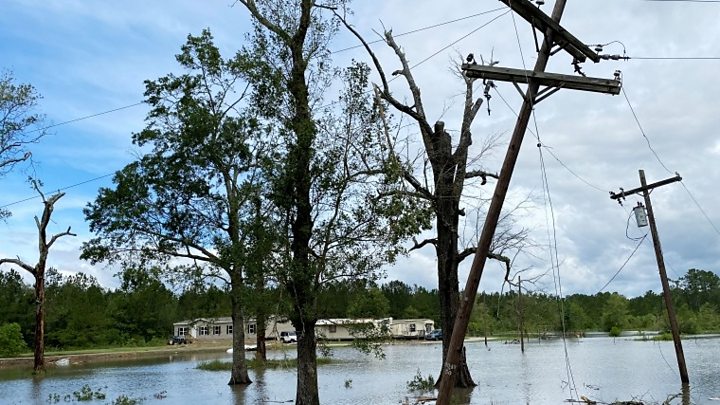
Media playback is unsupported on your device
Residents in coastal areas of Louisiana in the US face the prospect of weeks without power or water as the clean-up begins following the devastating impact of Hurricane Laura.
More than 400,000 were without power on Saturday morning and 200,000 without water, officials said.
Governor John Bel Edwards says the devastation and damage stretch all the way to northern parts of Louisiana.
Fourteen people were killed by the storm - 10 in Louisiana, four in Texas.
In Haiti, which was earlier badly hit by storms Marco and Laura, at least 31 people are now reported to have died.
President Donald Trump is visiting affected areas in Louisiana and Texas on Saturday.
What's the latest in the US?
The White House has declared a major disaster in several parishes in Louisiana - which will mean federal funds can be sent to the hardest-hit areas urgently.
"Assistance can include grants for temporary housing and home repairs, low-cost loans to cover uninsured property losses, and other programs to help individuals and business owners recover from the effects of the disaster," a White House statement said.
The Louisiana governor has called Laura "the strongest storm to ever hit Louisiana". It was a category-four hurricane at the time it hit.
Image copyright Reuters Image caption The damage is extensive and it will take time for communities to return to a sense of normality"The devastation and damage stretch from south-west Louisiana all the way through north Louisiana, with more than a half a million power outages remaining, tens of thousands of people displaced from their homes and, sadly, at least 10 lives lost," Governor Edwards said in a statement.
Of the 10 people to lose their lives in the state, five died from carbon monoxide poisoning from gas-powered emergency generators, four from trees falling and one from drowning.
In Texas, a man was killed when a tree hit his home, and three people lost their lives in Port Arthur, possibly from carbon monoxide poisoning, officials reported.
Around 8,000 homes were possibly destroyed in the two states, according to the Red Cross.
There was more structural damage from winds than anticipated, but the water damage was less than feared.
Some 1,500 people, including National Guard troops, are being deployed in rescue and clean-up missions.
Image copyright Reuters Image caption Communities have been helping each other - here owners of a restaurant serve free hot foodLauren Sylvester, a resident of Lake Charles, Louisiana, followed orders to evacuate.
She returned to her house on Friday to see power lines and trees strewn around the streets.
"It's still an incredible amount of damage," she told AP news agency.
Lawrence "Lee" Faulk had a similar experience - he found his home in Cameron Parish with no roof on.
"We need help," Mr Faulk told CBS news. "We need ice, water, blue tarps - everything that you would associate with the storm, we need it. Like two hours ago."
What other areas have suffered?
The death toll in Haiti has risen by 10 to 31 and eight people are missing, the country's civil protection service said. More than 6,000 homes were flooded in the country.
Four people are known to have died in neighbouring Dominican Republic.
Cuba suffered damage but did not record any deaths.
In Jamaica, there were reports of landslides and flooded roads.
The US territory of Puerto Rico was also hit.

 5 years ago
560
5 years ago
560 

